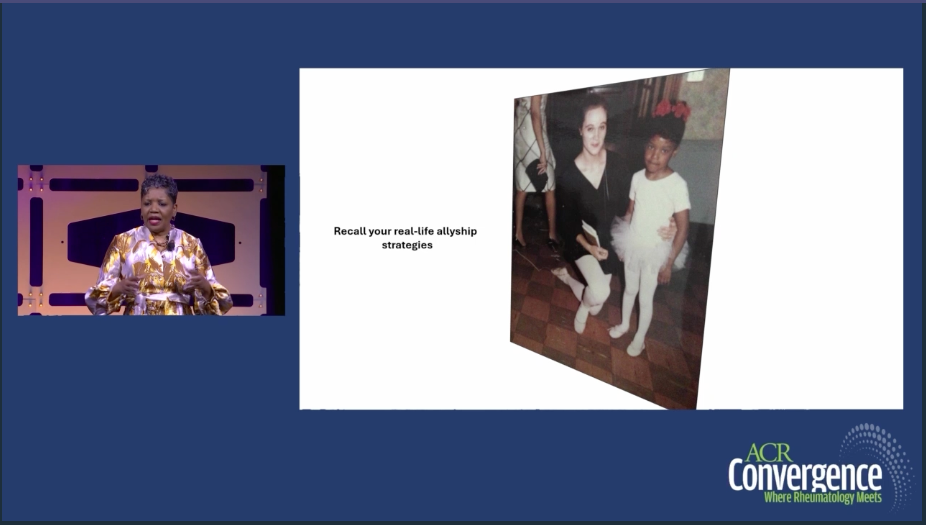Knowing the mental posture of another person can help with connection, she said.
It’s also important to understand the bases of social power, which include not only power based on position or title or the ability to punish, but also the power of experience and knowledge, and the power of mutual respect.
Understanding the bases of social power “helps people who don’t think they have any power—sometimes your patients, even—understand that they do have power.”
Do Something

This screenshot from ACR Convergence 2024’s keynote address shows Dwinita Mosby Tyler, PhD, now and when she was a child, with Miss Ann, the ballet teacher who showed up for her.
Dr. Mosby Tyler underscored several keys to allyship and making DEI a reality. One is to examine the pushback impulse when data show that your organization has room for improvement.
“The hardest thing in this work, I think, is when you have to reveal something to the organization that they weren’t ready to hear,” she said. “There’s pushback because it just can’t be true.” These data should be seen as a remedy, she said, rather than a problem.
Also, she said, beware of delegating and relegating—getting others to do the work because you think you’re not the one equipped to do it.
Be aware, she added, that diversity means the totality of everyone. “We get stuck when we start making the word ‘diversity’ a synonym for race or a synonym for people of color,” she said. “And so, when you hear the word, and you’re not a person of color, you then don’t see yourself in the definition.”
Another hurdle is the increasingly prevalent decline bias, she said, a tendency to reference the past as the right way or best way to do something.
“People may be afraid to make changes that they have no evidence around. They don’t have the research, the evidence, and they don’t know if they want to change whole systems for equity if they don’t know how that’s going to work out—especially for them,” she said.
“I believe in a race neutral, gender neutral way that you are representing Miss Ann work each and every day. … Don’t let DEI complicate you. What you’re doing really does make a difference.”
 Thomas Collins is a freelance medical writer based in Florida.
Thomas Collins is a freelance medical writer based in Florida.
Editor’s note: The session will be available on-demand to all registered ACR Convergence 2024 participants after the meeting through Oct. 10, 2025, by logging into the meeting website (https://acr24.eventscribe.net/index.asp).



